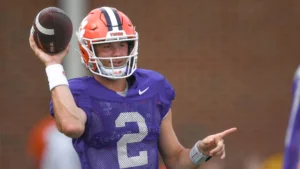
Charles Barkley: A Legacy of Loyalty, Generosity, and Controversy at Auburn University
Charles Barkley, a name synonymous with basketball excellence, transcended the sport to become a cultural icon. His journey from a raw, undersized forward at Auburn University to an NBA Hall of Famer is a testament to his talent, determination, and larger-than-life personality. However, beyond his athletic achievements, Barkley’s relationship with Auburn University has been marked by deep loyalty, significant contributions, and moments of controversy that have sparked discussions about the boundaries of collegiate athletics and the lengths to which alumni will go to support their alma mater.
Auburn University: The Foundation of a Legend
In 1981, Charles Barkley arrived at Auburn University with little fanfare. Standing at 6’4″ and weighing around 250 pounds, he was considered undersized for a forward. Yet, his raw talent was undeniable. Over three seasons, Barkley averaged 14.1 points and 9.6 rebounds per game, leading Auburn to its first-ever NCAA Tournament appearance in 1984 . His performance earned him the SEC Player of the Year award and solidified his status as a future NBA star.
Even after leaving for the NBA, Barkley’s connection to Auburn remained strong. He often spoke about the university as a place that shaped him both on and off the court. “Once you come to Auburn, you’re part of the family,” he remarked during the unveiling of his statue outside Auburn Arena . This sentiment underscored his deep-rooted affection for the institution that played a pivotal role in his development.
Philanthropy: A Commitment to Auburn’s Future
Barkley’s contributions to Auburn extend beyond his playing days. In recent years, he has made significant financial donations to support the university’s athletic programs. In 2024, he donated $1 million to the women’s basketball program, marking his second major contribution to Auburn that year . This followed an earlier $1 million gift to the full women’s athletics program, highlighting his commitment to fostering growth and success across all sports.
His philanthropic efforts are not limited to Auburn. Barkley has also made substantial donations to historically Black colleges and universities (HBCUs) and initiatives aimed at reducing recidivism through job training for former prisoners. These actions reflect his broader commitment to education and social justice.
While Barkley’s loyalty and generosity are commendable, certain actions have raised eyebrows regarding the ethical boundaries of collegiate athletics. In a candid moment, Barkley admitted to attempting to illegally recruit German basketball prodigy Dirk Nowitzki to Auburn. Recalling their first meeting, Barkley said, “I said, ‘where you going to play at?’ He said, ‘I have to go in the army.’ I said, ‘you can’t go in the army playing like that.’ So I call Nike and I says, ‘find out about this kid and tell him I’ll give him anything he wants to go to Auburn. Just tell him, anything he wants, we’ll get it done.'”
This admission sparked debates about the lengths to which alumni and boosters might go to influence recruitment, raising questions about the integrity of college sports and the enforcement of NCAA regulations.
Legacy: More Than Just a Basketball Player
Charles Barkley’s legacy at Auburn University is multifaceted. On the court, he was a trailblazer, setting records and paving the way for future generations. Off the court, his contributions have left an indelible mark on the university’s athletic programs. However, his actions also serve as a reminder of the complex interplay between loyalty, ambition, and the ethical considerations that govern collegiate athletics.
In the end, Charles Barkley is not just a former Auburn athlete; he is a symbol of the passion and dedication that alumni can have for their alma mater. His story is one of triumph, generosity, and the occasional controversy, reflecting the complexities of being a public figure in the world of college sports.





